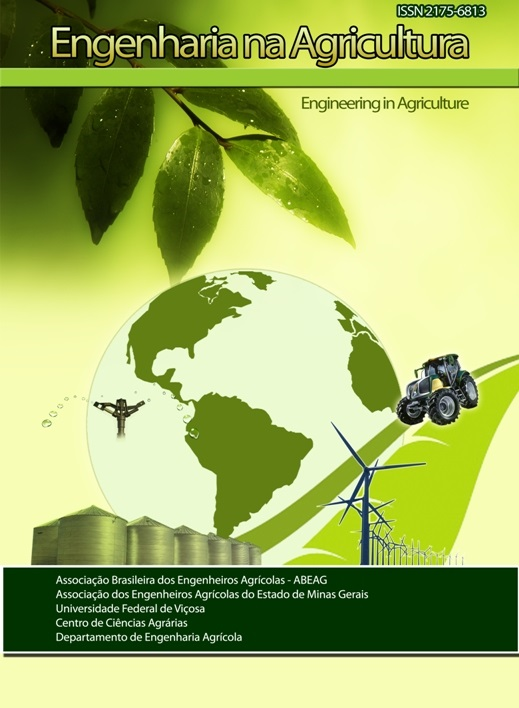Methodology of economic evaluation of externality emissions in relation to the value of electric power generated by the burning of biogas in the rural environment
DOI:
https://doi.org/10.13083/reveng.v29i1.11493Palavras-chave:
Biomass , energy resources , external impacts , renewable energyResumo
Brazilian cattle raising needs greater automation as a way to improve productivity and at the same time new ways to meet the growing energy demand. Thus, an alternative is to use renewable sources of electric energy such as biogas. This work proposes a methodology for economic evaluation of the externality denominated emissions, originating from the generation of electric energy through the burning of biogas from residues of Brazilian livestock. Thus, an equation was proposed and applied to obtain the value of this externality as a percentage of the value of electric energy, where greater results indicate greater potential for this externality. The results showed that the emissions, assessed as an externality and quantified on the basis of carbon credits can account for up to 69.4% of the electricity price, but if quantified in relation to the social impact of carbon, the externality in reference exceeds the value of electricity, reaching 408.4%. As a result, it is clear that the use of biogas for power generation in livestock can present other valuable products in addition to electricity and, consequently, can add value to livestock activity.
Downloads
Referências
ARAUJO, G. J. F. de; OLIVEIRA, S. V. W. B. de; OLIVEIRA, M. M. B. de. Economic Analysis of Internal Circulation Biodigesters and Vinasse Concentrators for the Generation of Electricity, Fertilizers, and Carbon Credits in Various Brazilian Economic Scenarios. Bioenergy Research, v. 12, n. 4, p. 1164-1186, 2019.
BRASIL. Ministério da Agricultura, Pecuária e Abastecimento. Agropecuária brasileira em números. 2019. In: Http://www.agricultura.gov.br/assuntos/politica-agricola/agropecuaria-brasileira-em-numeros (acessado em 19 de outubro de 2019).
CEMIG. Valores e tarifas de serviços. 2020. In: Http://www.cemig.com.br/pt-br/atendimento/Paginas/valores_de_tarifa_e_servicos.aspx (acessado em 15 de junho de 2020).
DEGANUTTI, R.; PALHACI, M.C.J.P.; ROSSI, M. TAVARES, R.; SANTOS C. Biodigestores rurais: modelo indiano, chinês e batelada. In: ENCONTRO DE ENERGIA NO MEIO RURAL. Anais, Campinas, SP, 2002.
ESCOLHAS. Impactos econômicos e sociais da tributação de carbono no Brasil. 2015. In: http://escolhas.org/wp-content/uploads/2016/09/impactos-economicos-e-sociais-da-tributacao-de-carbono-no-brasil.pdf (acessado em 15 de junho de 2020).
GOHAR, L. K.; SHINE, K. P. Equivalent CO2 and its use in understanding the climate effects of increased greenhouse gas concentrations. Weather, v. 62, n. 11, p. 307-311, 2007.
INVESTING, The economic and social impacts of a carbono tax in Brazil In: https://br.investing.com/commodities/carbon-emissions (acessado em 8 de junho de 2020).
JENSEN, I. G.; SKOVSGAARD, L. The impact of CO2-costs on biogas usage. Energy, v. 134, n. 1, p. 289-300, 2017.
JONES, B. A. Measuring externalities of energy efficiency investments using subjective well-being data: the case of led streetlights. Resource and Energy Economics, v. 52, p. 18-32, 2018.
LATAWIEC, A. E.; STRASSBURG, B.; SILVA, D.; ALVES-PINTO, H. N.; FRLTRAN-BARBIERI, R.; CASTRO, A.; IRIBARREM, A.; RANGEL, M. C.; KALIF, K. M.; GARDNER, T.; BEDUSCHI, F. Improving land management in Brazil: a perspective from producers. Agriculture, Ecosystems & Environment, v. 240, n. 1, p.276-286, 2017.
MARTINEZ-SANCHEZ, V.; KROMANN, M.A.; ASTRUP, T.F. Life cycle costing of waste management systems: overview, calculation principles and case studies. Waste Management, v. 36, p. 343-355, 2015.
MARTINEZ-SANCHEZ, V.; LEVIS, W. J.; DAMGAARD, A.; DECAROLIS, J. F.; BARLAZ, M. A.; ASTRUP, T. F. Evaluation of externality costs in life-cycle optimization of municipal solid waste management systems. Environmental Science & Technology, v. 51, n. 6, p. 3119-3127, 2017.
OGINO, A.; SOMMART, K.; SUBEPANG, S.; MITSUMORI, M.; HAYASHI, K.; YAMASHITA. T.; TANAKA, Y. Environmental impacts of extensive and intensive beef production systems in Thailand evaluated by life cycle assessment. Journal of Cleaner Production, v. 112, n. 1, p. 22-31, 2016.
REIS, E. Opportunities and challenges to the sustainable development of cattle raising in Brazil, 1970-2005. Economia, v. 18, n. 1, p. 18-39, 2017.
SHINE, P. SCULLY, T.; UPTON, J.; SHALLO, L.; MURPHY, M. D. Electricity & direct water consumption on Irish pasture based dairy farms: A statistical analysis. Applied Energy, v. 210, p. 529-537, 2018.
SOUZA, S. N. M.; Pereira, W. C.; Nogueira, C. E. C.; Pavan, A. A.; Sorde, A. Custo da eletricidade gerada em conjunto motor gerador utilizando biogas da suinocultura. Acta Scientiarum Tecchnology, v.26, p. 127-133, 2004.
YANG, J.; WANG, D.; LUO, Z.; ZENG, W. Influence of reflux ratio on the anaerobic digestion of pig manure in leach beds coupled with continuous stirred tank reactors. Waste Management, v. 97, p. 115-122, 2019.
Downloads
Publicado
Como Citar
Edição
Seção
Licença
Copyright (c) 2020 REVISTA ENGENHARIA NA AGRICULTURA - REVENG

Este trabalho está licenciado sob uma licença Creative Commons Attribution-NonCommercial 4.0 International License.
Autores que publicam nesta revista concordam com os seguintes termos:
O(s) autor(es) autoriza(m) a publicação do texto na da revista;
O(s) autor(es) garantem que a contribuição é original e inédita e que não está em processo de avaliação em outra(s) revista(s);
A revista não se responsabiliza pelas opiniões, ideias e conceitos emitidos nos textos, por serem de inteira responsabilidade de seu(s) autor(es);
É reservado aos editores o direito de proceder a ajustes textuais e de adequação às normas da publicação.
A partir da submissão, o autor estará cedendo integralmente seus direitos patrimoniais da obra à publicação, permanecendo detentor de seus direitos morais (autoria e identificação na obra) e de acordo com a Licença Creative Commons, CC BY-NC.








 Esta obra está licenciada com uma Licença
Esta obra está licenciada com uma Licença 